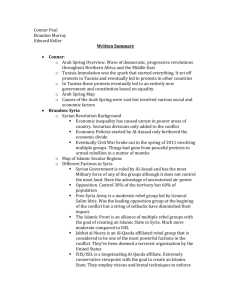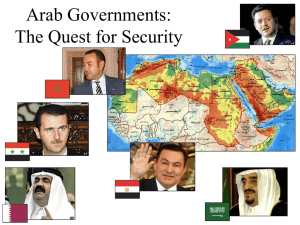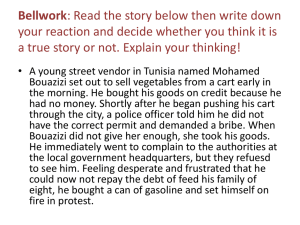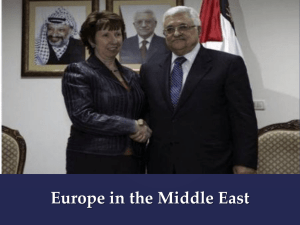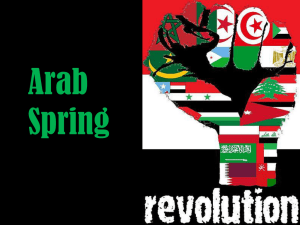The Arab Spring Nation Building Committee The series of
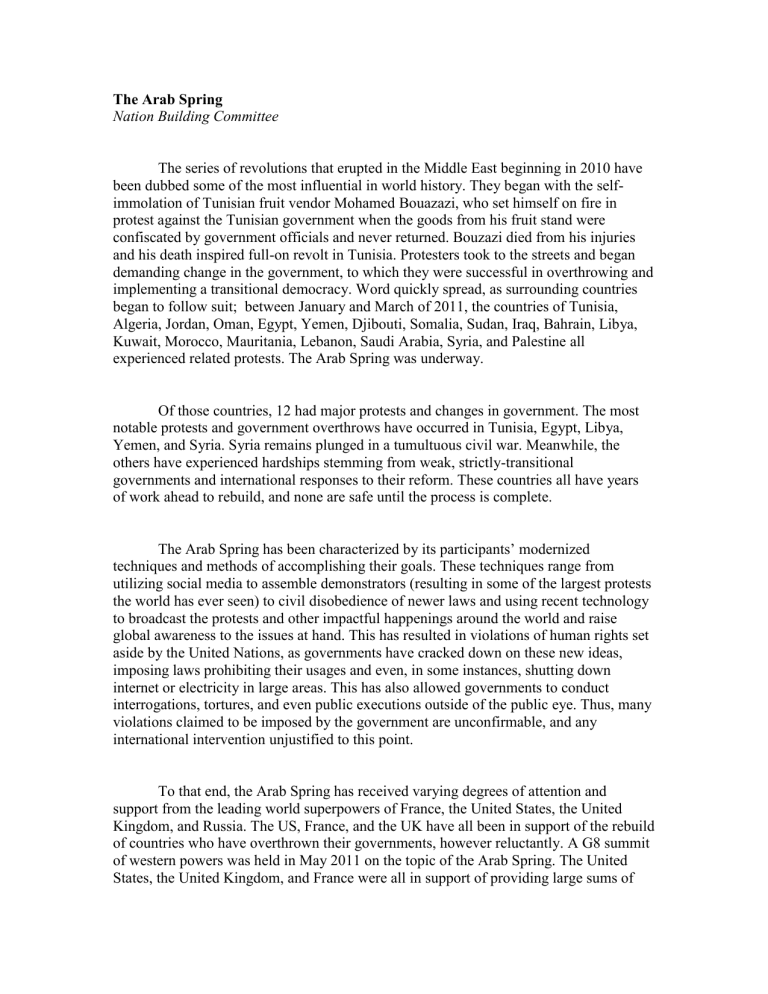
The Arab Spring
Nation Building Committee
The series of revolutions that erupted in the Middle East beginning in 2010 have been dubbed some of the most influential in world history. They began with the selfimmolation of Tunisian fruit vendor Mohamed Bouazazi, who set himself on fire in protest against the Tunisian government when the goods from his fruit stand were confiscated by government officials and never returned. Bouzazi died from his injuries and his death inspired full-on revolt in Tunisia. Protesters took to the streets and began demanding change in the government, to which they were successful in overthrowing and implementing a transitional democracy. Word quickly spread, as surrounding countries began to follow suit; between January and March of 2011, the countries of Tunisia,
Algeria, Jordan, Oman, Egypt, Yemen, Djibouti, Somalia, Sudan, Iraq, Bahrain, Libya,
Kuwait, Morocco, Mauritania, Lebanon, Saudi Arabia, Syria, and Palestine all experienced related protests. The Arab Spring was underway.
Of those countries, 12 had major protests and changes in government. The most notable protests and government overthrows have occurred in Tunisia, Egypt, Libya,
Yemen, and Syria. Syria remains plunged in a tumultuous civil war. Meanwhile, the others have experienced hardships stemming from weak, strictly-transitional governments and international responses to their reform. These countries all have years of work ahead to rebuild, and none are safe until the process is complete.
The Arab Spring has been characterized by its participants’ modernized techniques and methods of accomplishing their goals. These techniques range from utilizing social media to assemble demonstrators (resulting in some of the largest protests the world has ever seen) to civil disobedience of newer laws and using recent technology to broadcast the protests and other impactful happenings around the world and raise global awareness to the issues at hand. This has resulted in violations of human rights set aside by the United Nations, as governments have cracked down on these new ideas, imposing laws prohibiting their usages and even, in some instances, shutting down internet or electricity in large areas. This has also allowed governments to conduct interrogations, tortures, and even public executions outside of the public eye. Thus, many violations claimed to be imposed by the government are unconfirmable, and any international intervention unjustified to this point.
To that end, the Arab Spring has received varying degrees of attention and support from the leading world superpowers of France, the United States, the United
Kingdom, and Russia. The US, France, and the UK have all been in support of the rebuild of countries who have overthrown their governments, however reluctantly. A G8 summit of western powers was held in May 2011 on the topic of the Arab Spring. The United
States, the United Kingdom, and France were all in support of providing large sums of
financial to post-Arab Spring “fledgling democracies” such as Egypt and Tunisia. Many western superpowers also toyed with the idea of military involvement. Russia, on the other hand, has been in disagreement with its fellow superpowers, especially the United
States. Russia has dismissed the idea of military or financial aid for the Arab Spring and has condoned the United States for their involvement.
It is the Nation Building Committee’s duty and responsibility to ensure that the conflict is resolved as best as it can be. We will be diving into the conflict in the form of our own summit, taking place in January of 2012. This is at the height of the uprisings, and our job as a committee will be to resolve ongoing issues as well as prevent future discrepancies. This includes ending the war in Syria, easing the tensions around the world between greater powers aiming to intervene, and ensuring that the countries that are or are not protesting are provided the protection and security they need. Each country involved has its own unique issues within itself, and it is imperative that the NBC identify each of these and respond accordingly. With the help of those countries represented and their delegates, the conflict should see its end.
Discussion Questions:
General:
1.)
What role should countries with uprisings play in other countries’ conflicts within the Arab Spring? How should those countries respond within NBC and what measures should be taken?
2.) Should there be international intervention from the superpowers? If so, in what form?
Economy and Finance:
1.) What are positive economic effects that each country could experience with their own uprisings? What consequences could they face?
2.) Should the UN instill any economic measures upon countries attempting to rise up? In Syria? If so, should they support the people or the governments?
3.) Should wealthier countries provide aid for those rising up? What could be the effects of such intervention?
Political and Legal:
1.) Should alliances or unions be considered between countries with newer, more transitional governments as a result of overthrows?
2.) Who should oversee that transitional governments in these countries are functional? What should be done in case they are not?
3.) Should NBC oversee the creation of new constitutions for countries with new governments? Should a standard or template be set for these documents?
Security Council:
1.) Should UN or NATO forces take a greater role in conflict resolution within these countries? In Syria?
2.) Should the UN provide military aid (weapons, equipment, etc.) to ailing countries and peoples within their uprisings? Who should be responsible for this?
3.) How should the UN and NBC handle breach of airspace and other military jurisdictions within these countries?
4.) How should the UN handle the use/threat of chemical warfare in Syria from a military standpoint?
Social and Humanitarian:
1.) Who should be held responsible for the human rights violations conducted during conflicts in uprisings? How should they be handled?
2.) What can NBC do to help refugees and other victims of war within countries that experienced heavier conflict?
3.) How should the UN handle the use/threat of chemical warfare in Syria from a human rights standpoint?
Works Cited:
1.) Berkman, Fran. "Which Countries Actively Suppress Internet Freedom?"
Mashable . N.p., 27 Sept. 2012. Web. 29 Mar. 2013.
2.)
“Arab Spring.” Time Magazine. Apr. 2013.
3.) Ajami, Fouad. "The Arab Spring at One." Global . Foreign Affairs, Mar.-Apr.
2012. Web. 29 Mar. 2013.
4.) Blight, Garry, Sheila Pulham, and Paul Torpey. "Arab Spring: An Interactive
Timeline of Middle East Protests." The Guardian . Guardian News and Media, 01
May 2012. Web. 01 Apr. 2013.
5.) Kassim, Saleem. "Twitter Revolution: How the Arab Spring Was Helped By
Social Media." PolicyMic . N.p., July 2012. Web. 01 Apr. 2013
6.)
Gardner, Frank. “Tunisia one year on: Where the Arab Spring started.”
BBC
News.
BBC, 17 December 2011. Web. 29 Mar. 2013.
7.)
Randall, Colin. “France joins US in urging G8 to back Arab Spring with financial support.”
The National . Abu Dhabi Media, 25 May 2011. Web. 29 March 2013.
